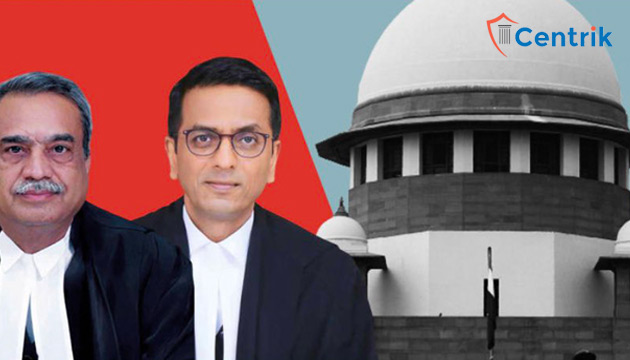
Status as on- 27/01/2023
According to the Supreme Court, an operational creditor is anyone who provides or receives operational services from the corporate debtor, which results in an operational debt.
A debt arising from an advance payment given to a corporate debtor for the supply of goods or services would be deemed an operational debt, according to the bench of Justice Mr. DY Chandrachud, Justice Mr. Surya Kant, and Justice Mr. Vikram Nath.
Case Detail: Consolidated Construction Consortium Ltd. v. Hitro Energy Solutions (P) Ltd., (2022) 7 SCC 164
In this case, the National Company Law Appellate Tribunal (NCLAT) dismissed an application under Section 9 of the Insolvency and Bankruptcy Code 2016 (IBC), holding that the applicant was a “purchaser” and thus did not meet the definition of an “operational creditor” under the IBC because it did not supply any goods or services to the Proprietary Concern.
One of the issues raised in the appeal before the Apex Court was whether the appellant-applicant, despite being a ‘purchaser,’ is an operational creditor under the IBC. [Other issues included (a) whether the respondent assumed the debt from the Proprietary Concern; and (iii) whether the application under Section 9 of the IBC is barred by limitation.
Operational Creditor and Debt
Section 5(21) defines “operational debt” as “a claim in respect of the provision of goods or services including employment or a debt in respect of the repayment of dues arising under any law for the time being in force and payable to the Central Government, any State Government or any local authority”. The term “operational creditor” refers to the person to whom an operational debt is owed, as well as any person to whom such obligation has been legally assigned or transferred.
The phrase “in respect of” in Section 5(21) has to be interpreted in a broad and purposive manner
The court noted that, in this case, NCLAT accepted the claim that, under the IBC, operational debt, and operational creditors would only include those who offer goods or services to a corporate debtor and would exclude those who receive goods or services from the corporate debtor. The bench rejected this ‘limited’ view for the following reasons:
“Section 5(21) defines ‘operational debt‘ as a “claim in respect of the provision of goods or services”. The operative requirement is that the claim must bear some nexus with a provision of goods or services, without specifying who is to be the supplier or receiver. Such an interpretation is also supported by the observations in the BLRC Report, which specifies that operational debt is in relation to the operational requirements of an entity. Second, Section 8(1) of the IBC read with Rule 5(1) and Form 3 of the 2016 Application Rules makes it abundantly clear that an operational creditor can issue a notice in relation to an operational debt either through a demand notice or an invoice. As such, the presence of an invoice (for having supplied goods or services) is not a sine qua non, since a demand notice can also be issued on the basis of other documents which prove the existence of the debt. This is made even more clear by Regulation 7(2)(b)(i) and (ii) of the CIRP Regulations 2016 which provides an operational creditor, seeking to claim an operational debt in a CIRP, an option between relying on a contract for the supply of goods and services with the corporate debtor or an invoice demanding payment for the goods and services supplied to the corporate debtor. While the latter indicates that the operational creditor should have supplied goods or services to the corporate debtor, the former is broad enough to include all forms of contracts for the supply of goods and services between the operational creditor and corporate debtor, including ones where the operational creditor may have been the receiver of goods or services from the corporate debtor. Finally, the judgment of this Court in Pioneer Urban (supra), in comparing allottees in real estate projects to operational creditors, has noted that the latter does not receive any time value for their money as a consideration but only provide it in exchange for goods or services. Indeed, the decision notes that “[e]xamples given of advance payments being made for turnkey projects and capital goods, where customization and uniqueness of such goods are important by reason of which advance payments are made, are wholly inapposite as examples vis-à-vis advance payments made by allottees”. Hence, this leaves no doubt that a debt which arises out of advance payment made to a corporate debtor for the supply of goods or services would be considered as an operational debt”
The court further stated that the expression “in respect of” in Section 5(21) must be read broadly and purposefully in order to cover all parties who give or receive operational services from the corporate debtor, resulting in an operational debt. When the appellant negotiated with the Proprietary Concern for the provision of light fittings, it clearly sought an operational service from them. Furthermore, when the contract was terminated but the Proprietary Concern nevertheless cashed the check for advance payment, it created an operating obligation in favor of the appellant, which is still outstanding. As a result, the appellant is an operational creditor under IBC Section 5(20)”, according to the court.
The court further stated that the disagreement, in this case, is not about the quality of services given by the Proprietary Concern, but rather the reimbursement of the advance fee paid to them following the cancellation of the underlying project.
Disclaimer: The above article is based on the personal interpretation of the related orders and laws. The readers are expected to take expert opinions before relying upon the article. For more information, please contact us at ibc@centrik.in.




 join For Updates
join For Updates